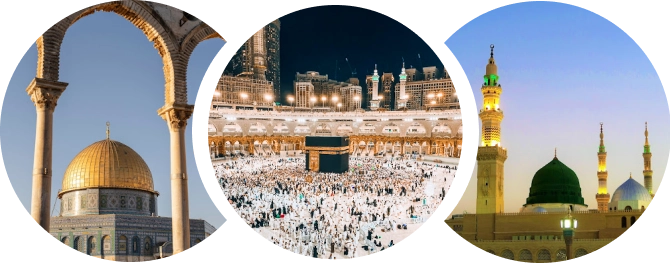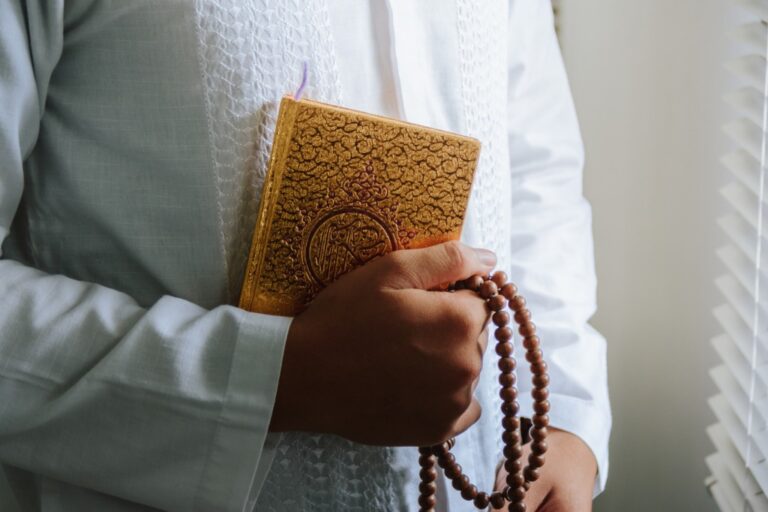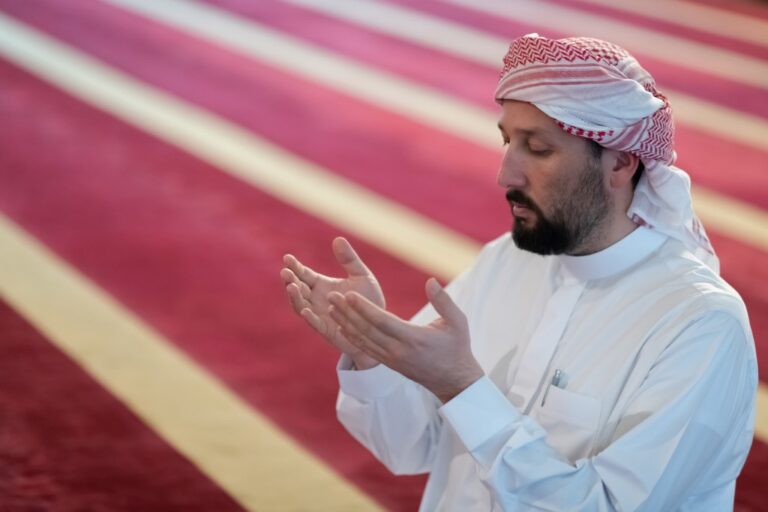Exploring the Significance and Benefits of Isha Prayer
Have you ever wondered about the deeper meaning of the Isha prayer, one of Islam’s five daily prayers? This sacred nightly ritual has a special place in Islamic tradition beyond simply fulfilling a religious obligation.
This comprehensive guide will reveal the true meaning, benefits, and spiritual rewards associated with Isha prayer and how it can contribute to your overall well-being.
Let us now embark on this enlightening journey and discover why praying Isha could become your most anticipated spiritual engagement of the day!
Understanding Isha Prayer
Isha prayer is the day’s fifth and final mandatory salah (Islamic prayer), performed after sunset but before midnight.
The timing of Isha Prayer
In the Islamic tradition, Isha prayer begins when the twilight after sunset has completely vanished, giving way to total darkness. This usually begins 90 minutes after the Maghrib (sunset) prayer and lasts until just before the Fajr (pre-dawn) prayers.
However, unless performing Isha in congregation, Muslim scholars recommend completing it as soon as possible. It is critical to maintain proper timing during the fifth mandatory Salah. It demonstrates adherence to religious norms and cultivates punctuality and discipline in the life of a believer.
The number of units (Rakats)
Isha prayer is made up of nine units known as Rakats, which are divided into three sections as follows:
- Four Fard (obligatory)
- Two Sunnah (Muakkadah)
- Three Witr
Isha begins with four Fard Rakats, which are required of all Muslim believers and are considered a sin if skipped. After completing this section, you will perform a set of two Sunnah (Muakadda) Rakats.
The final segment consists of three Witr Rakats in which special Duas (e.g., Dua el Qunoot) can be recited for spiritual growth and protection from evil inclinations.
This distinctive blend aids in life discipline, fostering good elements while suppressing immoral inclinations and promoting high morality among worshippers.
The Significance of Offering Isha Prayer
Isha prayer is extremely important in Islam because it is a time of deep spiritual connection and devotion to Allah SWT.
Importance as per Quranic verses
In numerous verses, the Quran, Islam’s holy book, emphasizes the significance of Isha prayer. Here is a verse from Surah Isra:
اَقِمِ الصَّلٰوةَ لِدُلُوۡكِ الشَّمۡسِ اِلٰى غَسَقِ الَّيۡلِ وَقُرۡاٰنَ الۡـفَجۡرِؕ اِنَّ قُرۡاٰنَ الۡـفَجۡرِ كَانَ مَشۡهُوۡدًا
Establish Prayer from the declining of the sun to the darkness of the night; and hold fast to the recitation of the Qur’an at dawn, for the recitation of the Qur’an at dawn is witnessed.95 (17:78)
By following this divine instruction, Muslims seek Allah SWT’s guidance and mercy while demonstrating their faith. Isha prayer reaffirms a Muslim’s devotion, bringing solace and peace through spiritual connection with their Creator.
In essence, these nightly acts serve as a manifestation of obedience to Islamic teachings highlighted in various Quranic verses, as well as an act of worship.
Importance as per Hadiths
According to Hadiths, offering Isha prayer holds great significance in Islam. The Holy Prophet (PBUH) emphasized the importance of this prayerand encouraged Muslims to perform it regularly.
It is narrated by Abu Hurayrah that Prophet PBUH said, “Whoever prays Isha in congregation, it is as if he has stood half of the night in prayer. And whoever prays Fajr in congregation, it is as if he has stood the entire night in prayer.” (Jami` at-Tirmidhi 221).
This Hadith emphasizes the enormous rewards for those who perform Isha prayer alongside other believers.
Another narration states that Allah SWT bestows special peace and tranquillity on those who consistently pray Isha. As a result, performing this prayer provides spiritual benefits and strengthens bonds within the Muslim community.
Benefits of Isha Prayer
Muslims can benefit from Isha prayer in various ways, including spiritual growth, mental and emotional peace, and physical relaxation and rejuvenation.
Spiritual benefits
Offering Isha prayer regularly has numerous spiritual benefits. Individuals can strengthen their connection with the Creator and deepen their faith by participating in this sacred ritual.
By setting aside time each night to communicate with Allah SWT, believers can find peace, tranquillity, and inner fulfillment. Isha prayer is also used to seek forgiveness for sins and to cleanse the heart of negative emotions.
It provides an opportunity for spiritual reflection, self-improvement, and personal growth.
Furthermore, performing Isha prayer regularly helps believers develop discipline and devotion to their religious obligations, fostering a stronger relationship with Allah SWT.
Mental and emotional benefits
Offering Isha prayer regularly can have profound mental and emotional benefits. This spiritual practice gives people a sense of peace and solace at night, allowing them to relax and reconnect with their inner selves.
Focusing on prayer helps people achieve mindfulness, reduce stress, improve memory, and increase focus.
Furthermore, a study discovered that Salat prayer improved cognitive functioning in elderly Hui (a minority Muslim group in China) Muslims, serving as an alternative exercise option for the elderly.
This type of meditation helps to develop concentration and discipline, which can be applied to many aspects of life and lead to success in both personal and professional endeavors.
Furthermore, Isha prayer promotes relaxation and reduces anxiety by providing a space for introspection and seeking guidance from the Almighty.
Individuals find comfort in knowing that they are not alone in facing life’s challenges, but rather have the support of Allah SWT guiding them towards a path of righteousness through this practice.
Physical benefits
Regularly offering Isha prayer has enormous spiritual and mental benefits but also several physical benefits.
According to one study, Salah’s physical movements, such as standing, bowing, and prostrating, activate nearly all muscles in the body without causing fatigue. This improves blood circulation, keeps joints flexible, and muscles strong.
Another study found that performing Salah regularly can improve heart health by increasing heart rate variability (HRV), and lowering the risk of cardiovascular disease.
Extra Rewards For Performing Isha Prayer
Praying Isha in congregation not only brings the additional rewards of unity and brotherhood among believers, but also grants blessings equivalent to spending half the night in worship, if a person prays in congregation. As Prophet Muhammad PBUH has said:
“ مَنْ شَهِدَ الْعِشَاءَ فِي جَمَاعَةٍ كَانَ لَهُ قِيَامُ نِصْفِ لَيْلَةٍ وَمَنْ صَلَّى الْعِشَاءَ وَالْفَجْرَ فِي جَمَاعَةٍ كَانَ لَهُ كَقِيَامِ لَيْلَةٍ ”
“Whoever attends Isha (prayer) in congregation, then he has (the reward as if he had) stood half of the night. And whoever prays Isha and Fajr in congregation, then he has (the reward as if he had) spend the entire night standing (in prayer).”
Rewards of praying in Congregation
For Muslims, praying in congregation brings enormous rewards and blessings. When believers gather for Isha Prayer, they form a unified front in worshiping Allah SWT.
This unity fosters a sense of brotherhood and solidarity among worshippers. Furthermore, the Prophet Muhammad PBUH emphasized the importance of praying in congregation, stating that the rewards for congregation prayer are 27 times greater than praying alone.
صَلاَةُ الْجَمَاعَةِ تَفْضُلُ صَلاَةَ الْفَذِّ بِسَبْعٍ وَعِشْرِينَ دَرَجَةً ”.”
“The prayer in congregation is twenty-seven times superior to the prayer offered by person alone.” Sahih al-Bukhari 645
Furthermore, congregational prayer fosters spiritual growth by allowing individuals to witness the devotion and commitment of others to their faith. By joining fellow Muslims in congregation, believers establish a deep connection with Allah SWT and strengthen their bonds with other members of the Ummah.
Rewards of the optional units (Sunnah and Nafl)
Performing the optional units of Isha prayer (Sunnah and Nafl) brings countless rewards and blessings; these additional prayers are highly recommended by the Prophet Muhammad (PBUH) and provide a unique opportunity to earn extra rewards.
مَنْ صَلَّى فِي اللَّيْلِ وَالنَّهَارِ ثِنْتَىْ عَشْرَةَ رَكْعَةً سِوَى الْمَكْتُوبَةِ بُنِيَ لَهُ بَيْتٌ فِي الْجَنَّةِ
“Whoever prays twelve rak’ahs during the night and day apart from the prescribed prayers, a house will be built for him in Paradise.” Sunan an-Nasa’i 1805
Believers can strengthen their connection with Allah SWT and increase their faith by voluntarily offering these units after the obligatory prayers.
Sunnah and Nafl prayers are also expressions of gratitude and devotion to our Creator, allowing us to seek His forgiveness, protection, and guidance.
We achieve inner peace, purify our hearts, and cultivate a strong sense of discipline in our lives through these acts of worship.
Furthermore, practicing these extra units regularly demonstrates that someone is committed to fulfilling their religious duties while also aiming to improve their physical movements and spiritual development as Muslims.
Common Misconceptions about Isha Prayer
Misconceptions about the timing and significance of Isha prayer frequently cause Muslims some confusion.
Misconception about the timing
One common misconception about the Isha prayer is that it can be performed at any time before the Fajr prayer, which causes confusion and inconsistency in performing this important prayer.
We should follow the basic rule that Prophet Muhammad PBUH has told us:
“ الْوَقْتُ الأَوَّلُ مِنَ الصَّلاَةِ رِضْوَانُ اللَّهِ وَالْوَقْتُ الآخِرُ عَفْوُ اللَّهِ ”
“The beginning of the time for Salat is pleasing to Allah, and the end of its time is pardoned by Allah.”
So, rather than needing clarification about the timing, one should strive to perform the prayers at the start time.
This ensures they take advantage of the opportunity to receive the associated rewards and blessings.
Misconception about its importance
One common misconception about the significance of Isha prayer is that it is unimportant compared to other prayers, which stems from a need for more understanding about the rewards and blessings associated with performing Isha prayer.
In fact, the Isha prayer is essential in Islam because it marks the end of all mandatory prayers for the day and represents our submission to Allah SWT before retiring for the night.
Furthermore, Prophet Muhammad (PBUH) emphasized the importance of Isha prayer by stating that whoever offers this prayer regularly will receive the reward of praying half of the night.
As a result, it is critical to recognize and appreciate the significance of Isha prayer as an essential component of our faith journey, seeking closeness to Allah SWT and reaping abundant blessings in return.
How to Enhance the Experience of Isha Prayer
Prepare yourself for prayer by finding a quiet and clean space, focusing during prayer by clearing your mind of distractions, and understanding the meaning behind each part of the prayer.
Getting ready for prayer
Proper preparation is essential for having a meaningful and focused experience during Isha prayer.
Begin by finding a calm and quiet place where you can concentrate without distractions. Then, before standing in front of Allah SWT, perform ablution (wudu) to purify yourself.
Remember that wudu not only cleanses the body but also prepares the mind and heart for prayer; position your prayer mat in the direction of the Qibla (the Kaaba in Mecca) as a symbol of unity with fellow believers worldwide.
In a long hadith, Prophet Muhammad PBUH explained the effect of ablution, saying that the person who performs ablution will have his sins removed, leaving him (as innocent) as he was on the day his mother bore him. Sahih Muslim 832
Take a moment to reflect on your intentions, reminding yourself of the purpose of this act of worship – seeking closeness to Allah SWT, repentance for sins, and gratitude for His blessings.
Focus during prayer
Concentration and mindfulness are required to truly connect with Allah SWT and find inner peace during prayer, so one should strive to clear their mind of distractions and be fully present in the moment.
There are a few things you can try to improve your focus.
Hadith About removing distraction
‘A’isha reported: The Messenger of Allah (PBUH) had a garment which had designs upon it, and this distracted him in prayer. He gave it to Abu Jahm and took a plain garment in its place, which is known as anbijaniya. (Book 4, Number 1133)
The preceding Hadith emphasizes the importance of praying attentively and removing anything distracting during prayer.
Memorizing translation in the native language.
We are unable to pay attention to our Salah because we need to understand what we are saying; although translation is not an option for the Arabic language, it makes a significant difference.
When you know what you are praying for and what you are asking Allah SWT for during Salah, you are more likely to stay focused during salah.
Praying at a slow pace
The true pleasure of Salah is in praying slowly; however, it is a shame for us Muslims that we see it as a burden rather than a gift and blessing from Allah SWT; we rush so much in our prayer that we frequently forget the number of Rakats; may Allah SWT have mercy on us.
If you are serious about staying focused in your Salah, begin praying slowly; it is also Sunnah to perform salah slowly.
Salah is a Form Of Mindfulness Meditation
Research shows that practicing mindfulness through Salat can reduce stress, improve memory, focus and concentration, and even strengthen personal relationships. During Isha Prayer, we can experience a deep sense of tranquility and spiritual fulfillment by focusing solely on our connection with Allah SWT.
We cultivate a heightened state of awareness as we align our thoughts and actions with the words of our prayers, bringing us closer to Allah’s guidance and blessings.
Regularly offering Salat not only has profound spiritual benefits, but also has a positive impact on our physical well-being.
According to one study, the activeness involved in different postures during prayer stimulates various bodily systems, such as visual, vestibular, and somatosensory systems, all of which influence balance and coordination.
Another study found that individuals who practice Salat regularly have better dynamic balance than those who do not.
Understanding the meaning of the prayer
Understanding the meaning of this prayer entails more than just reciting words; it entails cultivating a profound sense of devotion and gratitude to Allah.
Muslims seek to purify their hearts, minds, and souls through the Isha prayer, which serves as a reminder of our duty to our fellow humans and the importance of maintaining moral soundness in all aspects of life.
By praying Isha every night, believers find comfort, peace, and guidance despite the difficulties and distractions of daily life; in essence, Isha prayer is an opportunity to grow spiritually and receive great blessings in both this life and the afterlife.
The Connection between Isha Prayer and Other Prayers
Discover the profound connection between Isha and other prayers, and how it brings a sense of reflection and gratitude at the end of your day. It also serves as a link to the start of a new day with the Fajr prayer.
Read on to expand your knowledge and strengthen your spiritual journey.
The last prayer of the day: Reflection and Gratitude
After a long day, offering Isha prayer allows Muslims to reflect on their actions and express gratitude for the blessings they have received. It is a time for self-reflection in which individuals consider their actions and seek forgiveness from Allah SWT.
Reflecting and expressing gratitude during Isha prayer brings comfort, growth, and a closer bond with Allah SWT.
The link to Fajr Prayer: Ending and Beginning
Offering the Isha prayer acts as a bridge between the end of the day and the start of the next day, connecting the last prayer of the day with the first prayer of the next day: the Fajr prayer.
We conclude our day with gratitude and reflection by performing the Isha prayer before going to bed, seeking forgiveness for any shortcomings or mistakes.
We never know if we will wake up the next day, but we do know that prayers wash away our sins, and sleeping after praying Isha increases our chances of maghfirah.
The offering of Fajr prayer at dawn marks the beginning of a new day filled with opportunities for growth and blessings; the link between these two prayers emphasizes the importance of maintaining consistency in our worship by bookending each day with sincere devotion to Allah SWT.
As one night ends and another begins, praying Isha and then Fajr demonstrates our commitment to seeking Allah’s guidance in all aspects of our lives, reminding us that every moment is an opportunity for repentance, spiritual growth, and aligning ourselves with what pleases Him.
Conclusion
In conclusion, discovering the significance and benefits of Isha prayer reveals the immense rewards and blessings it brings to one’s spiritual, mental, and physical well-being, and believers can experience a deep connection with Allah SWT by offering this prayer with sincerity and devotion.
Isha prayer cultivates discipline and focus, which leads to inner peace and tranquillity, so let us embrace this beautiful act of worship and reap its many benefits in this life and the next.
FAQs
1. What is the significance of Isha prayer in Islam?
Isha prayer is one of the five daily Fard (obligatory) prayers Muslims must perform. It is performed after sunset and before midnight, symbolizing the end of the day and seeking Allah SWT’s guidance and blessings for the night ahead.
2. What are some benefits of consistently performing Isha prayer?
Consistently performing Isha prayer has numerous spiritual and mental benefits, including maintaining a strong connection with Allah SWT, promoting inner peace and tranquillity, strengthening faith, purifying the heart, and serving as a means of seeking forgiveness for sins committed during the day.
3. How can performing Isha prayer impact an individual’s daily life?
By establishing a consistent practice of worship, Isha prayer instills discipline into one’s daily routine. It serves as a reminder to prioritize spirituality amidst worldly responsibilities, bringing balance to life. Additionally, through reflection during this prayer, individuals can seek guidance from Allah SWT for important decisions or challenges they may be facing.
4. Are there any specific rewards or blessings associated with performing Isha prayer?
According to Islamic teachings, those who consistently perform the Isha prayer receive abundant rewards from Allah SWT, including spiritual blessings such as increased closeness to Allah SWT, protection from evil influences, enlightenment in understanding religion, and self-reflection. It is also believed that offering voluntary prayers after completing ‘Ish’ carries enormous rewards that can significantly multiply good deeds on the Day of Judgment.
استكشاف أهمية وفوائد صلاة العشاء
هل تساءلت يومًا عن المعنى الأعمق لصلاة العشاء، إحدى الصلوات الخمس اليومية في الإسلام؟ تتمتع هذه الطقوس الليلية المقدسة بمكانة خاصة في التقاليد الإسلامية تتجاوز مجرد الوفاء بواجب ديني.
سيكشف هذا الدليل الشامل عن المعنى الحقيقي والفوائد والمكافآت الروحية المرتبطة بصلاة العشاء وكيف يمكن أن تساهم في رفاهيتك بشكل عام.
دعونا نبدأ الآن في هذه الرحلة المفيدة ونكتشف لماذا يمكن أن تصبح صلاة العشاء أكثر ارتباطاتك الروحية المتوقعة في اليوم!
فهم صلاة العشاء
صلاة العشاء هي الصلاة الإلزامية الخامسة والأخيرة في اليوم (الصلاة الإسلامية)، ويتم إجراؤها بعد غروب الشمس ولكن قبل منتصف الليل.
توقيت صلاة العشاء
في التقليد الإسلامي، تبدأ صلاة العشاء عندما يختفي الشفق بعد غروب الشمس تمامًا، مما يفسح المجال للظلام التام. يبدأ هذا عادة بعد 90 دقيقة من صلاة المغرب ويستمر حتى قبل صلاة الفجر مباشرة.
ومع ذلك، ما لم يتم أداء صلاة العشاء في جماعة، يوصي علماء المسلمين بإكمالها في أسرع وقت ممكن. ومن الأهمية بمكان الحفاظ على التوقيت المناسب خلال الصلاة الإلزامية الخامسة. إنه يوضح الالتزام بالمعايير الدينية ويعزز الالتزام بالمواعيد والانضباط في حياة المؤمن.
عدد الوحدات (الركعات)
تتكون صلاة العشاء من تسع ركعات تعرف بالركعات، وتنقسم إلى ثلاثة أقسام على النحو التالي:
- أربعة فرائض (إلزامية)
- سنتان (معتقدتان)
- ثلاثة وتر
تبدأ صلاة العشاء بأربع ركعات، وهي واجبة على جميع المؤمنين المسلمين وتعتبر خطيئة إذا تم تخطيها. بعد الانتهاء من هذا القسم، ستؤدي مجموعة من ركعتين من ركعات السنة.
يتكون الجزء الأخير من ثلاث ركعات وتر يمكن فيها تلاوة أدعية خاصة (على سبيل المثال، دعاء القنوت) للنمو الروحي والحماية من الميول الشريرة.
إن هذا المزيج المميز يساعد على الانضباط الحياتي، وتعزيز عناصر الخير، وقمع الميول غير الأخلاقية، وتعزيز الأخلاق الحميدة بين العباد.
أهمية صلاة العشاء
تعتبر صلاة العشاء في غاية الأهمية في الإسلام لأنها وقت للتواصل الروحي العميق والإخلاص لله سبحانه وتعالى.
الأهمية وفقًا الآيات القرآنية
في العديد من الآيات، يؤكد القرآن الكريم، كتاب الإسلام المقدس، على أهمية صلاة العشاء. وهذه آية من سورة الإسراء:
اَقِمِ الصَّلَوَةَ لِدُلُوۡكِ الشَّمۡسِ اِلٰى غَسَقِ الَّيۡلِ وَقُرۡاَنَ الۡـفَجۡرِ اِنَّ قُرۡاٰنَ الۡـفَجۡرِ كَان مَشۡهُوۡدًا
أقم الصلاة لدلوك الشمس إلى غسق الليل؛ وحافظ على قراءة القرآن فجرا، فإن قراءة القرآن فجرا مشهودة.95 (17:78)
من خلال اتباع هذه التعليمات الإلهية، يطلب المسلمون هداية الله سبحانه وتعالى ورحمته أثناء إظهار إيمانهم. تؤكد صلاة العشاء من جديد إخلاص المسلم، وتجلب العزاء والسلام من خلال الاتصال الروحي مع خالقه.
في جوهرها، تعد هذه الأعمال الليلية بمثابة مظهر من مظاهر طاعة التعاليم الإسلامية التي أبرزتها الآيات القرآنية المختلفة، فضلاً عن كونها عبادة.
الأهمية حسب الأحاديث< /ح3>
وفقًا الأحاديث، فإن تقديم صلاة العشاء له أهمية كبيرة في الإسلام. وشدد النبي الكريم (صلى الله عليه وسلم) على أهمية هذه الصلاة ووشجع المسلمين على أدائها بانتظام.
عن أبي هريرة أن النبي صلى الله عليه وسلم قال: "من صلى العشاء في جماعة فكأنما قام نصف الليل، ومن صلى الفجر في جماعة فكأنما قام نصف الليل" الليل كله في الصلاة." ( جامع الترمذي 221).
يؤكد هذا الحديث على الأجر العظيم لمن صلى العشاء مع سائر المؤمنين.
وفي رواية أخرى أن الله سبحانه وتعالى يمنح سلامًا وطمأنينة خاصة لأولئك الذين يحافظون على صلاة العشاء. ونتيجة لذلك، فإن أداء هذه الصلاة يوفر فوائد روحية ويقوي الروابط داخل المجتمع المسلم.
فوائد صلاة العشاء
يمكن للمسلمين الاستفادة من صلاة العشاء بطرق مختلفة، بما في ذلك النمو الروحي، والسلام العقلي والعاطفي، والاسترخاء الجسدي وتجديد النشاط.
الفوائد الروحية
إن تقديم صلاة العشاء بانتظام له فوائد روحية عديدة. يمكن للأفراد تقوية علاقتهم بالخالق وتعميق إيمانهم من خلال المشاركة في هذه الطقوس المقدسة.
من خلال تخصيص وقت كل ليلة للتواصل مع الله سبحانه وتعالى، يمكن للمؤمنين أن يجدوا السلام والهدوء والوفاء الداخلي. كما تستخدم صلاة العشاء لطلب المغفرة من الذنوب وتطهير القلب من المشاعر السلبية.
يوفر فرصة للتأمل الروحي، وتحسين الذات، والنمو الشخصي.
علاوة على ذلك، فإن أداء صلاة العشاء بانتظام يساعد المؤمنين على تطوير الانضباط والإخلاص لالتزاماتهم الدينية، وتعزيز علاقة أقوى مع الله سبحانه وتعالى.
فوائد عقلية وعاطفية
إن تقديم صلاة العشاء بانتظام يمكن أن يكون له فوائد عقلية وعاطفية عميقة. تمنح هذه الممارسة الروحية الناس شعورًا بالسلام والعزاء في الليل، مما يسمح لهم بالاسترخاء وإعادة التواصل مع ذواتهم الداخلية.
التركيز على الصلاة يساعد الإنسان على تحقيق اليقظة الذهنية، وتقليل التوتر، وتحسين الذاكرة، وزيادة التركيز.
علاوة على ذلك، اكتشفت دراسة أن صلاة الصلاة تحسن الأداء المعرفي لدى كبار السن من مسلمي الهوي (أقلية مسلمة في الصين). ، وهو بمثابة خيار تمرين بديل لكبار السن.
يساعد هذا النوع من التأمل على تطوير التركيز والانضباط، وهو ما يمكن تطبيقه على العديد من جوانب الحياة ويؤدي إلى النجاح في كل من المساعي الشخصية والمهنية.
علاوة على ذلك، فإن صلاة العشاء تعزز الاسترخاء وتقلل من القلق من خلال توفير مساحة للتأمل وطلب التوجيه من الله عز وجل.
يشعر الأفراد بالراحة عندما يعلمون أنهم ليسوا وحدهم في مواجهة تحديات الحياة، بل يحظون بدعم الله سبحانه وتعالى الذي يرشدهم نحو طريق الصلاح من خلال هذه الممارسة.
الفوائد المادية
إن أداء صلاة العشاء بانتظام له فوائد روحية وعقلية هائلة، ولكنه أيضًا له فوائد جسدية عديدة.
وفقًا لإحدى دراسة، تنشط الحركات الجسدية لصلاح، مثل الوقوف والركوع والسجود. جميع عضلات الجسم تقريبًا دون التسبب في التعب. يؤدي ذلك إلى تحسين الدورة الدموية، والحفاظ على مرونة المفاصل، وقوة العضلات.
وجدت دراسة أن أداء الصلاة بانتظام يمكن أن يحسن صحة القلب عن طريق زيادة تقلب معدل ضربات القلب (HRV)، وخفض معدل ضربات القلب. خطر الإصابة بأمراض القلب والأوعية الدموية.
مكافآت إضافية لأداء صلاة العشاء
إن صلاة العشاء في جماعة لا تجلب فقط مكافآت إضافية للوحدة والأخوة بين المؤمنين، ولكنها تمنح أيضًا بركات تعادل قضاء نصف الليل في العبادة، إذا صلى الإنسان في جماعة. كما قال النبي محمد صلى الله عليه وسلم:
" مَنْ شَهِدَ الْعِشَاءَ فِي جَمَاعَةٍ كَان لَهُ قِيَامُ نِصْفِ لَيْلَةٍ وَمَنْ صَلَّى الْعِشَاءَ وَالْفَجْرَ فِي جَمَاعَةٍ كَان لَهُ كَقِيَامِ لَيْلَةٍ "
"من صلى العشاء في جماعة فله قيام نصف الليل ومن صلى العشاء والفجر في جماعة فله قيام نصف الليل." وبيت الليل كله قائما."
ثواب الصلاة في الجماعة
بالنسبة للمسلمين، فإن الصلاة في الجماعة تجلب لهم مكافآت وبركات هائلة. عندما يجتمع المؤمنون لصلاة العشاء فإنهم يشكلون جبهة موحدة في عبادة الله سبحانه وتعالى.
وتعزز هذه الوحدة الشعور بالأخوة والتضامن بين المصلين. علاوة على ذلك، أكد النبي محمد صلى الله عليه وسلم على أهمية صلاة الجماعة، موضحًا أن أجر صلاة الجماعة أعظم من صلاة الفرد بـ 27 مرة.
صَلاَةُ الْجَمَاعَةِ تَفْضُلُ صَلاَةَ الْفَذِّ بِسَبْعٍ وَعِشْرِينَ دَرَجَةً "."
"صلاة الجماعة تفضل صلاة الفرد بسبع وعشرين درجة". صحيح البخاري 645
علاوة على ذلك، تعزز صلاة الجماعة النمو الروحي من خلال السماح للأفراد أن يشهدوا إخلاص الآخرين والتزامهم بإيمانهم. من خلال الانضمام إلى إخوانهم المسلمين في الجماعة، يقيم المؤمنون علاقة عميقة مع الله سبحانه وتعالى ويقوي روابطهم مع أعضاء الأمة الآخرين.
مكافآت الوحدتين الاختياريتين (السنة والنفل)
إن أداء الركائز الاختيارية لصلاة العشاء (السنة والنوافل) يجلب فوائد وبركات لا تعد ولا تحصى؛ هذه الصلوات الإضافية أوصى بها النبي محمد (صلى الله عليه وسلم) بشدة وتوفر فرصة فريدة لكسب مكافآت إضافية.
مَنْ صَلَّى فِي اللَّيْلِ وَالنَّهَارِ ثِنْتَىْ عَشْرَةَ رَكْعَةً سِوَى الْمَكْتُوبَةِ بُنِيَ لَهُ بَيْتٌ فِي الْجَنَّةِ
"من صلى في الليل والنهار اثنتي عشرة ركعة غير المكتوبة بني له بيت في الجنة." سنن النسائي 1805
يمكن للمؤمنين تقوية ارتباطهم بالله سبحانه وتعالى وزيادة إيمانهم من خلال تقديم هذه الوحدات طوعًا بعد الصلاة المفروضة.
إن صلاة السنة والنافلة هي أيضًا تعبيرات عن الامتنان والإخلاص لخالقنا، مما يسمح لنا بطلب عفوه وحمايته وإرشاده.
إننا نحقق السلام الداخلي، ونطهر قلوبنا، وننمي إحساسًا قويًا بالانضباط في حياتنا من خلال هذه العبادات.
علاوة على ذلك، فإن ممارسة هذه الوحدات الإضافية بانتظام يوضح أن الشخص ملتزم بالوفاء بواجباته الدينية بينما يهدف أيضًا إلى تحسين حركاته الجسدية وتطوره الروحي كمسلم.
مفاهيم خاطئة شائعة حول صلاة العشاء
إن المفاهيم الخاطئة حول توقيت وأهمية صلاة العشاء كثيرًا ما تسبب بعض الارتباك لدى المسلمين.
فهم خاطئ حول التوقيت
من المفاهيم الخاطئة الشائعة حول صلاة العشاء أنه يمكن أداؤها في أي وقت قبل صلاة الفجر، مما يسبب ارتباكًا وعدم تناسق في أداء هذه الصلاة المهمة.
علينا أن نتبع القاعدة الأساسية التي أخبرنا بها النبي محمد صلى الله عليه وسلم:
" الْوَقْتُ الأَوَّلُ مِنَ الصَّلاَةِ رِضْوَانُ اللَّهِ وَالْوَقْتُ الآخِرُ عَفْوُ اللَّهِ "
"أول وقت الصلاة رضوان الله وآخر وقتها عفو الله."
لذلك، بدلًا من الحاجة إلى توضيح التوقيت، ينبغي للمرء أن يجتهد في أداء الصلاة في وقتها.
وهذا يضمن لهم الاستفادة من فرصة الحصول على المكافآت والبركات المرتبطة بها.
فهم خاطئ لأهميته
أحد المفاهيم الخاطئة الشائعة حول أهمية صلاة العشاء هو أنها غير مهمة مقارنة بالصلوات الأخرى، وهو ما ينبع من الحاجة إلى مزيد من الفهم حول المكافآت والبركات المرتبطة بأداء صلاة العشاء.
في الواقع، صلاة العشاء ضرورية في الإسلام لأنها تمثل نهاية جميع الصلوات المفروضة في النهار وتمثل استسلامنا لله سبحانه وتعالى قبل الخلود إلى الليل.
كما أكد النبي محمد (ص) على أهمية صلاة العشاء بقوله أن من حافظ على هذه الصلاة كان له أجر قيام نصف الليل.
ونتيجة لذلك، من الأهمية بمكان أن ندرك ونقدر أهمية صلاة العشاء باعتبارها عنصرًا أساسيًا في رحلتنا الإيمانية، والتقرب إلى الله سبحانه وتعالى وجني بركات وافرة في المقابل.
كيفية تعزيز تجربة صلاة العشاء
جهز نفسك للصلاة من خلال إيجاد مكان هادئ ونظيف، والتركيز أثناء الصلاة من خلال تصفية ذهنك من المشتتات، وفهم المعنى الكامن وراء كل جزء من الصلاة.
الاستعداد للصلاة
يعد الإعداد المناسب أمرًا ضروريًا للحصول على تجربة هادفة ومركزة أثناء صلاة العشاء.
ابدأ بإيجاد مكان هادئ وهادئ حيث يمكنك التركيز دون تشتيت الانتباه. ثم قبل أن تقف بين يدي الله سبحانه وتعالى، توضأ لتطهر نفسك.
تذكر أن الوضوء لا يطهر الجسم فحسب، بل يهيئ العقل والقلب للصلاة أيضًا؛ ضع سجادة صلاتك في اتجاه القبلة (الكعبة المشرفة في مكة) كرمز للوحدة مع إخوانك المؤمنين في جميع أنحاء العالم.
في حديث طويل، أوضح النبي محمد صلى الله عليه وسلم أثر الوضوء، فقال إن من توضأ غفرت ذنوبه، وبقي كيوم ولدته أمه. صحيح مسلم 832
توقف لحظة للتفكير في نواياك، وذكّر نفسك بالغرض من هذه العبادة - وهو التقرب إلى الله سبحانه وتعالى، والتوبة من الذنوب، والشكر على نعمه.
التركيز أثناء الصلاة
يتطلب التركيز واليقظة للتواصل الحقيقي مع الله سبحانه وتعالى وإيجاد السلام الداخلي أثناء الصلاة، لذلك يجب على المرء أن يسعى جاهداً لتصفية ذهنه من الانحرافات ويكون حاضرًا بشكل كامل في اللحظة.
هناك بعض الأشياء التي يمكنك تجربتها لتحسين تركيزك.
حديث في إزالة الهاء
عن عائشة قالت: كان لرسول الله صلى الله عليه وسلم ثوب فيه رسم فيشغله في الصلاة. فأعطاه لأبي جهم فأخذ مكانه ثوبا يقال له الأنبيجانية. (الكتاب الرابع، العدد 1133)
وقد أكد الحديث السابق على أهمية الإنتباه إلى الصلاة وإزالة ما يشتت الانتباه أثناء الصلاة.
حفظ الترجمة باللغة الأم.
نحن غير قادرين على الاهتمام بصلاتنا لأننا بحاجة إلى فهم ما نقوله؛ على الرغم من أن الترجمة ليست خيارًا للغة العربية، إلا أنها تُحدث فرقًا كبيرًا.
عندما تعرف ما تصلي من أجله وما تطلبه من الله سبحانه وتعالى أثناء الصلاة، فمن المرجح أن تحافظ على تركيزك أثناء الصلاة.
الصلاة بوتيرة بطيئة
إن المتعة الحقيقية للصلاة تكمن في الصلاة ببطء؛ ولكن من العار لنا نحن المسلمين أن نرى ذلك عبئًا وليس هدية ونعمة من الله سبحانه وتعالى؛ نحن نستعجل في صلاتنا لدرجة أننا ننسى في كثير من الأحيان عدد الركعات؛ رحمنا الله سبحانه وتعالى.
إذا كنت جادًا في التركيز على صلاتك، فابدأ بالصلاة ببطء؛ ومن السنة أيضًا أداء الصلاة ببطء.
صلاح هو شكل من أشكال التأمل الذهني
تظهر الأبحاث أن ممارسة اليقظة الذهنية من خلال الصلاة يمكن أن تقلل من التوتر، وتحسن الذاكرة والتركيز، بل وتقوي العلاقات الشخصية. خلال صلاة العشاء، يمكننا أن نختبر شعورًا عميقًا بالهدوء والوفاء الروحي من خلال التركيز فقط على علاقتنا بالله سبحانه وتعالى.
نحن ننمي حالة عالية من الوعي عندما ننسق أفكارنا وأفعالنا مع كلمات صلواتنا، مما يجعلنا أقرب إلى هدى الله وبركاته.
إن تقديم الصلاة بانتظام ليس له فوائد روحية عميقة فحسب، بل له أيضًا تأثير إيجابي على صحتنا الجسدية.
وفقًا لإحدى الدراسات، فإن النشاط الذي تنطوي عليه الأوضاع المختلفة أثناء الصلاة يحفز مختلف أعضاء الجسم. الأنظمة، مثل الأنظمة البصرية والدهليزية والحسية الجسدية، وكلها تؤثر على التوازن والتنسيق.
وجدت دراسة أخرى أن الأفراد الذين يمارسون الصلاة بانتظام يتمتعون بتوازن ديناميكي أفضل من أولئك الذين لا تفعل ذلك.
فهم معنى الصلاة
إن فهم معنى هذه الصلاة يتطلب أكثر من مجرد تلاوة الكلمات؛ فهو يستلزم تنمية شعور عميق بالإخلاص والامتنان لله.
يسعى المسلمون إلى تنقية قلوبهم وعقولهم وأرواحهم من خلال صلاة العشاء، والتي تعد بمثابة تذكير بواجبنا تجاه إخواننا من البشر وأهمية الحفاظ على السلامة الأخلاقية في جميع جوانب الحياة.
بصلاة العشاء كل ليلة، يجد المؤمنون الراحة والسلام والهداية على الرغم من صعوبات الحياة اليومية ومشتتاتها؛ في جوهرها، صلاة العشاء هي فرصة للنمو الروحي والحصول على بركات عظيمة في الدنيا والآخرة.
العلاقة بين صلاة العشاء والصلوات الأخرى
اكتشف العلاقة العميقة بين صلاة العشاء والصلوات الأخرى، وكيف أنها تجلب لك شعورًا بالتأمل والامتنان في نهاية يومك. كما أنها بمثابة رابط لبدء يوم جديد مع صلاة الفجر.
تابع القراءة لتوسيع معرفتك وتعزيز رحلتك الروحية.
آخر صلاة في اليوم: التأمل والامتنان
بعد يوم طويل، يتيح أداء صلاة العشاء للمسلمين التفكير في أفعالهم والتعبير عن الامتنان للنعم التي تلقوها. إنه وقت للتأمل الذاتي حيث يفكر الأفراد في أفعالهم ويطلبون المغفرة من الله سبحانه وتعالى.
إن التأمل والتعبير عن الامتنان أثناء صلاة العشاء يجلب الراحة والنمو والارتباط الوثيق بالله سبحانه وتعالى.
رابط صلاة الفجر: النهاية والبداية
إن صلاة العشاء بمثابة جسر بين نهاية اليوم وبداية اليوم التالي، حيث تربط آخر صلاة في اليوم بأول صلاة في اليوم التالي: صلاة الفجر.
ونختم يومنا بالشكر والتدبر بصلاة العشاء قبل النوم والاستغفار من أي تقصير أو خطأ.
لا نعرف أبدًا ما إذا كنا سنستيقظ في اليوم التالي، لكننا نعلم أن الصلاة تغسل ذنوبنا، والنوم بعد صلاة العشاء يزيد من فرص المغفرة.
إن أداء صلاة الفجر عند الفجر يمثل بداية يوم جديد مليء بفرص النمو والبركات؛ ويؤكد الارتباط بين هاتين الصلاتين على أهمية الحفاظ على الاتساق في عبادتنا من خلال حجز كل يوم بإخلاص خالص لله سبحانه وتعالى.
مع انتهاء ليلة وبدء أخرى، فإن صلاة العشاء ثم الفجر تظهر التزامنا بطلب هداية الله في جميع جوانب حياتنا، وتذكرنا بأن كل لحظة هي فرصة للتوبة والنمو الروحي والتوافق مع ما يرضينا. هو.
الاستنتاج
في الختام، فإن اكتشاف أهمية صلاة العشاء وفوائدها يكشف عن المكافآت والبركات الهائلة التي تجلبها لرفاهية الفرد الروحية والعقلية والجسدية، ويمكن للمؤمنين تجربة اتصال عميق مع الله سبحانه وتعالى من خلال أداء هذه الصلاة بإخلاص. والتفاني.
تعمل صلاة العشاء على الانضباط والتركيز، مما يؤدي إلى السلام الداخلي والطمأنينة، فلنحتضن هذه العبادة الجميلة ونجني فوائدها الكثيرة في الدنيا والآخرة.
الأسئلة الشائعة
1. ما أهمية صلاة العشاء في الإسلام؟
صلاة العشاء هي إحدى الصلوات الخمس اليومية التي يجب على المسلمين أداءها. يتم أداؤها بعد غروب الشمس وقبل منتصف الليل، مما يرمز إلى نهاية اليوم وطلب الهداية من الله سبحانه وتعالى وبركاته في الليل.
2. ما هي بعض فوائد أداء صلاة العشاء باستمرار؟
إن أداء صلاة العشاء باستمرار له فوائد روحية وعقلية عديدة، بما في ذلك الحفاظ على اتصال قوي مع الله سبحانه وتعالى، وتعزيز السلام الداخلي والهدوء، وتعزيز الإيمان، وتنقية القلب، وتكون بمثابة وسيلة للاستغفار عن الذنوب المرتكبة خلال النهار. .
3. كيف يمكن أن تؤثر صلاة العشاء على حياة الفرد اليومية؟
من خلال إنشاء ممارسة متسقة للعبادة، تغرس صلاة العشاء الانضباط في روتين الفرد اليومي. إنه بمثابة تذكير لإعطاء الأولوية للروحانية وسط المسؤوليات الدنيوية، مما يحقق التوازن في الحياة. بالإضافة إلى ذلك، من خلال التأمل أثناء هذه الصلاة، يمكن للأفراد طلب التوجيه من الله سبحانه وتعالى لاتخاذ القرارات المهمة أو التحديات التي قد يواجهونها.
4. هل هناك مكافآت أو بركات محددة مرتبطة بأداء صلاة العشاء؟
وفقًا للتعاليم الإسلامية، فإن أولئك الذين يؤدون صلاة العشاء باستمرار يحصلون على مكافآت وافرة من الله سبحانه وتعالى، بما في ذلك البركات الروحية مثل زيادة القرب من الله سبحانه وتعالى، والحماية من التأثيرات الشريرة، والتنوير في فهم الدين، والتأمل الذاتي. ويعتقد أيضًا أن أداء صلاة التطوع بعد الانتهاء من صلاة العشاء يحمل مكافآت هائلة يمكن أن تضاعف الحسنات بشكل كبير يوم القيامة.







